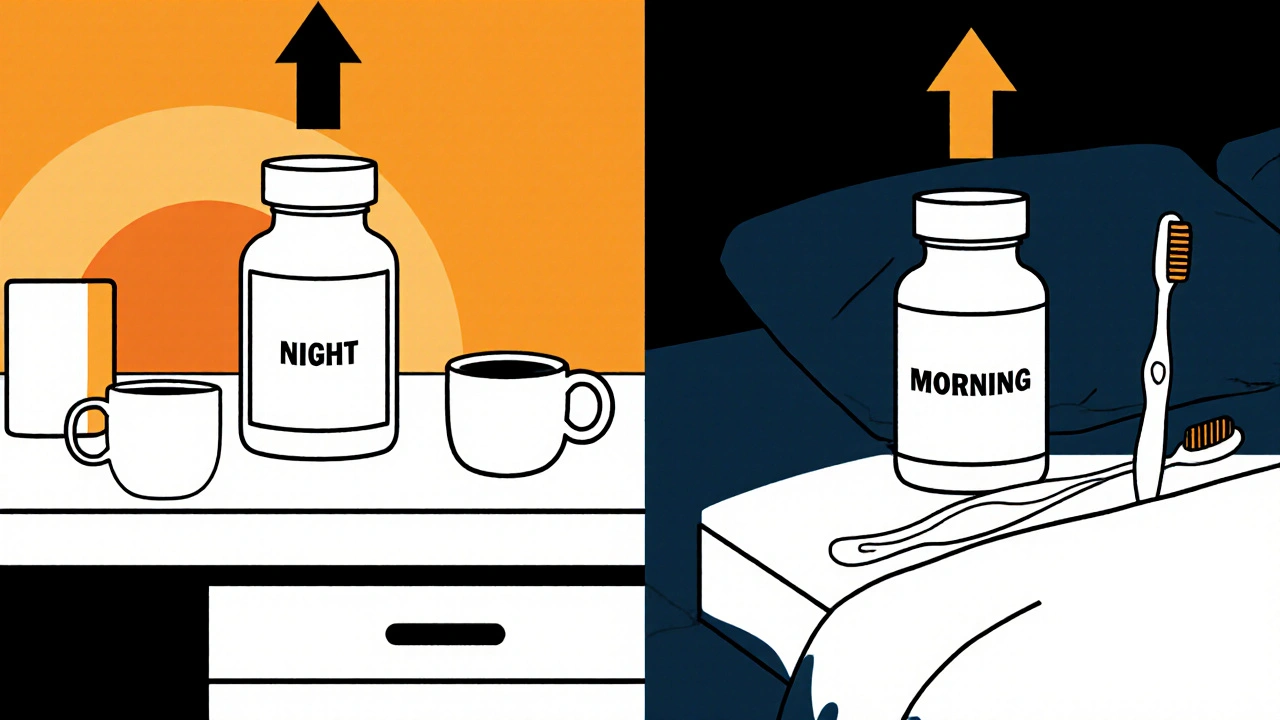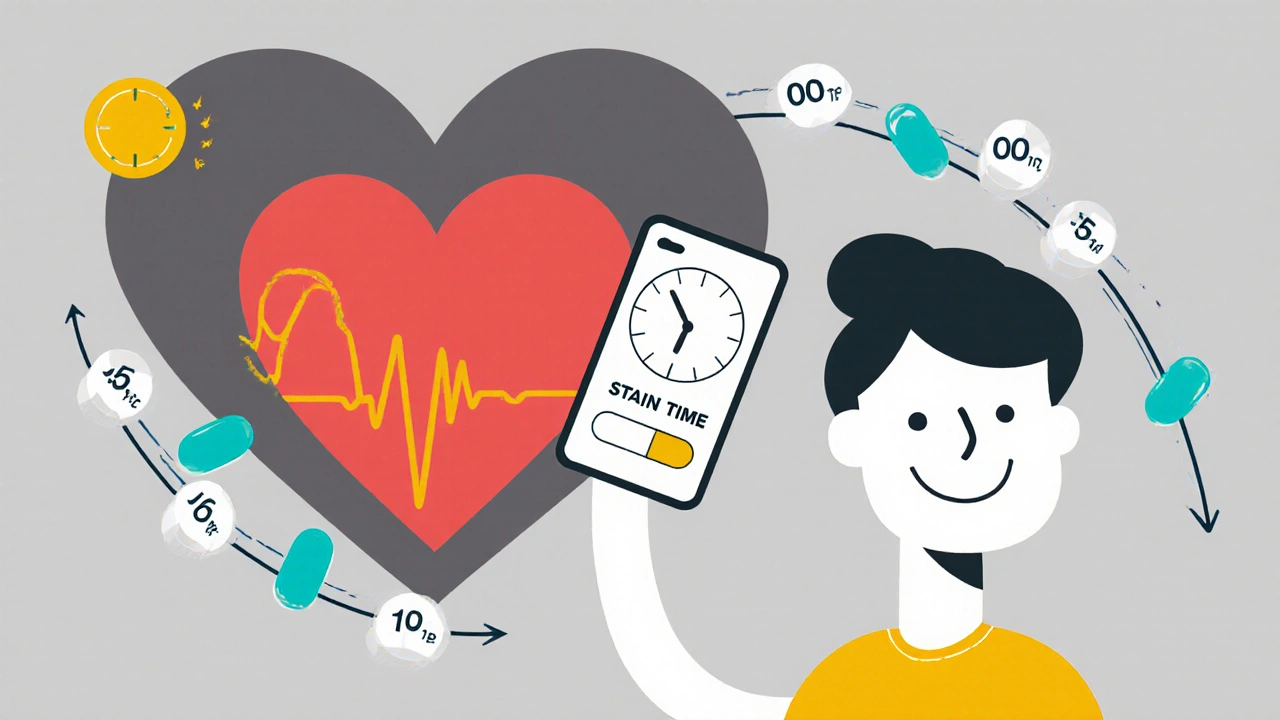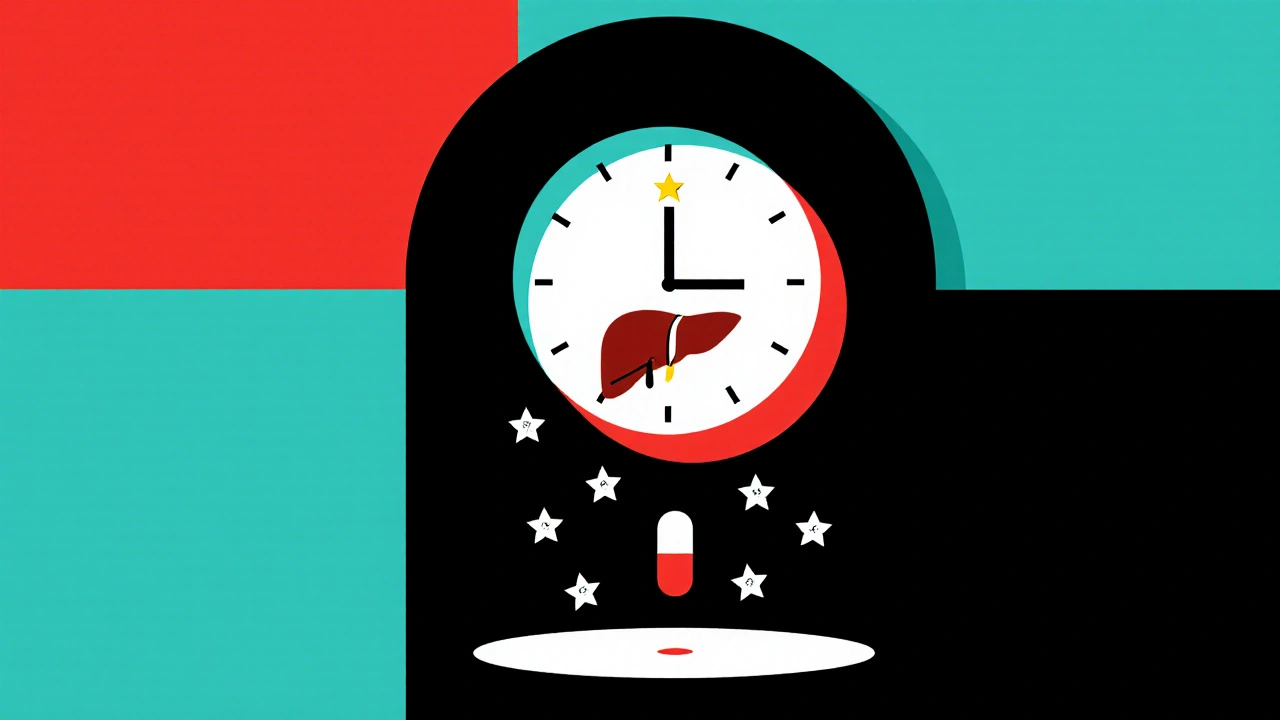For decades, doctors told patients to take statins at night. The logic was simple: your liver makes most of its cholesterol while you sleep. So, if you took a statin before bed, it would hit hardest when your body was busiest making bad cholesterol. But here’s the twist-statin timing doesn’t matter as much as you think. Not anymore.
Why Night Was the Old Rule
Back in the 1980s, when statins like simvastatin and lovastatin were new, doctors noticed something. These drugs didn’t last long in the body. Their half-life? Just a few hours. Meanwhile, research showed cholesterol production spikes between midnight and 4 a.m. So, giving the drug at night made sense. If the statin was still in your system when your liver kicked into high gear, you got the most bang for your buck. Studies confirmed it. One 1995 trial found that taking 20mg of simvastatin at night lowered LDL cholesterol by 13.4% more than taking it in the morning. Another showed a 50% relative improvement in cholesterol reduction when simvastatin was taken at bedtime. For patients on these early statins, timing wasn’t just helpful-it was critical.But Then Everything Changed
The game shifted when newer statins hit the market. Atorvastatin, rosuvastatin, pitavastatin-they didn’t just last a few hours. They lasted 14 to 20 hours. That means even if you took them at 8 a.m., they were still working at 2 a.m. when your liver was making cholesterol. A major 2017 analysis of 17 studies involving over 3,300 people found the difference between morning and night dosing for these long-acting statins was tiny: just 0.5% to 2.5% better LDL reduction at night. That’s less than 3%-far below the 5-7% drop doctors consider clinically meaningful. In other words, if you’re on rosuvastatin or atorvastatin, taking it at night won’t give you a noticeable advantage over taking it in the morning.What About Side Effects?
A lot of people worry that taking statins at night might cause more muscle pain, liver issues, or even raise diabetes risk. But the data says otherwise. A 2021 analysis of over 4 million statin prescriptions showed no difference in side effects between morning and night users. Muscle aches? Liver enzymes? Blood sugar spikes? All happened at nearly the same rate-8.7% for nighttime, 8.9% for morning. The difference? Statistically meaningless. If you’ve ever blamed your statin for muscle soreness, don’t assume it’s the time of day. It’s more likely your dose, age, genetics, or other meds you’re taking. Switching from night to morning won’t fix it. And switching from morning to night won’t make it worse.
Adherence Is the Real Killer
Here’s the truth no one talks about enough: missing doses hurts more than wrong timing. A 2019 study of nearly 12,500 statin users found that people told to take their meds at night missed more doses. Their medication possession ratio (MPR)-a measure of how consistently they took their pills-was 0.87. Morning takers? 0.98. That’s over two extra missed doses per month for nighttime users. Real people say it plainly on Reddit: "I kept forgetting my simvastatin at night. My doctor switched me to morning rosuvastatin. My LDL actually improved because I never miss a dose now." This isn’t an anomaly. Another study showed that when patients on simvastatin were given smartphone reminders to take their pill at 8 a.m., they took it 92% of the time. Without reminders, nighttime dosing only hit 76%. The result? Morning dosing with reminders matched the LDL-lowering power of unassisted nighttime dosing.What Should You Do?
If you’re on a short-acting statin-like simvastatin, lovastatin, or fluvastatin-then yes, night still has a slight edge. But even then, consistency matters more. If you’re forgetting your pill at 11 p.m. because you’re watching TV or have insomnia, switching to morning with a phone alarm is smarter than sticking to a schedule you can’t keep. If you’re on atorvastatin, rosuvastatin, pitavastatin, or pravastatin? Timing is basically irrelevant. Take it when it fits your life. Breakfast? Dinner? Bedtime? Doesn’t matter. What matters is that you take it every single day.What Doctors Are Saying Now
The American College of Cardiology’s 2022 guidelines say it clearly: "Timing should be individualized based on patient preference and lifestyle." No more blanket rules. No more "always take it at night." If you’ve been taking your statin in the morning for years and your cholesterol is under control? Don’t change a thing. If you’re on simvastatin and always forget at night? Talk to your doctor about switching to morning or switching to a long-acting statin. Community pharmacists in the U.S. now recommend morning dosing for all statins unless there’s a clear reason not to. Why? Because 68% of them have seen patients struggle with nighttime routines-and the tiny efficacy gain from night dosing doesn’t justify the missed doses.
The Bigger Picture
The market has shifted, too. In 2010, less than half of new statin prescriptions were for long-acting versions. Today? Over 80%. That means most people on statins today don’t need to worry about timing at all. The drug is built to work all day, every day. Even the FDA and European regulators have updated labels. Rosuvastatin and atorvastatin no longer say "take at night." Simvastatin and lovastatin still do-but only because they’re fading out of use. The future? Circadian-release pills that slowly release statins overnight, so you don’t even have to think about it.Bottom Line: Do This Now
- If you’re on simvastatin, lovastatin, or fluvastatin: Night is slightly better-but only if you take it every night. If you forget? Switch to morning or ask about switching to a long-acting statin.
- If you’re on atorvastatin, rosuvastatin, pitavastatin, or pravastatin: Take it whenever works. Morning, noon, or night. Consistency beats clock time.
- If you’re struggling to remember: Set a daily phone alarm. Use a pill organizer. Link it to brushing your teeth or eating breakfast.
- If you’re experiencing side effects: Don’t blame the time of day. Talk to your doctor about dose, drug type, or possible interactions.
The old rule of "take statins at night" was based on good science-for its time. But science moves. And so should your routine. Your goal isn’t to hit a perfect time. It’s to take your pill every day, without fail. That’s the only thing that truly lowers your risk of heart attack and stroke.
Should I take my statin at night or in the morning?
It depends on the type of statin you’re taking. If you’re on simvastatin, lovastatin, or fluvastatin, taking it at night gives a small benefit because these drugs don’t last long. But if you’re on atorvastatin, rosuvastatin, pitavastatin, or pravastatin, timing doesn’t matter-these work all day. What matters most is taking it every day. If you forget at night, switch to morning. Consistency beats perfect timing.
Does taking statins at night cause more side effects?
No. Studies tracking over 4 million statin prescriptions found no difference in side effects like muscle pain, liver issues, or diabetes risk between night and morning dosing. Side effects are linked to the drug itself, your dose, age, or other medications-not the time of day you take it.
Can I switch my statin from night to morning?
Yes, and you should if it helps you take it regularly. For long-acting statins like rosuvastatin or atorvastatin, switching is safe and won’t hurt your results. For short-acting statins like simvastatin, switching to morning may slightly reduce effectiveness-but if you were missing doses at night, you’ll likely do better overall by taking it in the morning with a reminder.
Why do some doctors still say to take statins at night?
Some doctors learned the old rule and haven’t updated their practice. Others may be prescribing simvastatin or lovastatin-drugs that still benefit from nighttime dosing. But guidelines have changed. The American College of Cardiology now says timing should match your lifestyle. If you’re on a newer statin, night isn’t required.
What if I take my statin at lunchtime?
If you’re on a long-acting statin (atorvastatin, rosuvastatin, etc.), lunchtime is perfectly fine. These drugs stay active for 14-20 hours, so they’ll still be working during your liver’s peak cholesterol production at night. The key is consistency-take it at the same time every day, whether it’s breakfast, lunch, or dinner.
Will switching statin timing affect my cholesterol numbers?
Only if you switch from a consistent nighttime routine to an inconsistent one. For long-acting statins, switching from night to morning won’t change your LDL levels. For short-acting statins, switching to morning might reduce effectiveness by a few percent-but if you start taking it every day instead of missing doses, your numbers will likely improve overall.
Is there a best time of day to take statins for weight loss or energy?
No. Statins don’t cause weight loss or boost energy. They lower cholesterol to reduce heart disease risk. Any claims about statins affecting weight or energy levels are not supported by science. If you’re feeling tired after starting a statin, talk to your doctor about dose or drug type-not timing.
